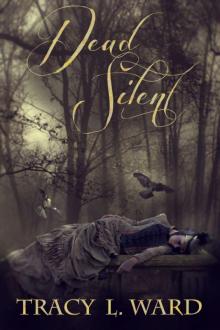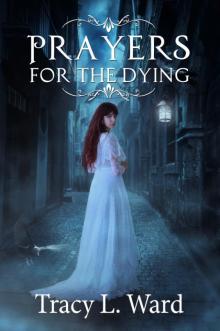- Home
- Tracy L. Ward
Dead Silent Page 21
Dead Silent Read online
Page 21
He knew his father was ruthless enough to renege on their agreement. Working under his mother's name had given everyone what they wanted but now Lord Marshall seemed panic stricken. Ainsley himself realized the position they were all in and felt the panic rising in him as well. Technically Ainsley was the eldest, the sole heir to the Marshall fortune and his brother had no legal claim to any of the money or the title he had grown up knowing would be his one day. Should their family secret be revealed, by anyone involved, they'd all be called to task. Ainsley would no longer be able to practice medicine once his presence was requested in the House of Lords. Although certainly not penniless, Daniel's world would be shaken and in truth Lord Marshall was under no obligation to provide their brother with anything.
Lord Marshall would be made a fool, and Margaret would be labeled wanton. Two glasses later and Ainsley wondered what anyone would have to gain from revealing their family's darkest secret. Lord Marshall said it himself, without his wife to appease there was no need to condone Ainsley's work at the hospital. When he thought himself the second son, the spare, Ainsley had never understood his father's pressure. With this new information it made sense. Ainsley was Lord Marshall's only true heir and it must have pained him greatly that the boy who would take his title was not his, and the boy who was his had no interest in his title.
“What are you thinking?” Margaret asked.
“I'm thinking he did it.”
“Who? Daniel?”
Ainsley shook his head remembering she was not privy to his thoughts unless he expressed them. “Dr. Lehmann. What if their relationship turned sour, bitter? He must have been supplying her with drugs for years, Margaret.”
She shook her head in disbelief. “What would he have to gain from her death?”
“Revenge? For wanting to return to her family.” Ainsley set his glass down sharply on the desk.
“She was his willing partner.” She closed her eyes as if trying to suppress a memory. “She showed no remorse.”
“She wouldn't, would she? Especially if her eldest was a result of her affair.”
“What are you saying, Peter?”
“I am saying that judging from Dr. Lehmann's behaviour the other night he knows something and your presence made him uncomfortable.”
“We have no proof,” Margaret pleaded.
“We will before long.”
Chapter 26
And the old earth must die.
Of all the hospital the east wing was the quietest with the apothecary and its laboratories buffering the wails of the pain ridden and dying for the head staff that had offices there. A long, well lit corridor displayed portraits of notable surgeons and physicians, chief benefactors and contributors. Like a hall of note for the rich and richer, the pictures were commissioned by the very men they were meant to honour, an odd arrangement Ainsley realized as he walked the length of the hall. He wondered if he too, in the evening of his life, would feel the need to commemorate himself with a portrait and a brass plaque.
At the end of the hall and just before Dr. Lehmann's door Ainsley saw the surgeon's own portrait, his name neatly embossed and a quote underneath.
In nothing do men more nearly approach the gods
than in giving health to men.
-Cicero
Ainsley snorted when he read the words, knowing the damage this man had done to his mother and the Marshall family as a whole. It was that vengeful spirit that spurred Ainsley on to what he was about to do.
Glancing up and down the hall, Ainsley stood at Dr. Lehmann's door. He knew the doctor was not in, having checked with Jonas, Ainsley knew the doctor had a full morning of surgeries and would not venture back into his office until the afternoon. Had Jonas known what Ainsley was about he would not have been so obliging but that is why Ainsley had formed a ruse under which to enquire.
Pulling his hand from his pocket, Ainsley held a long, slender blade and slipped it into the iron key hole. It did not matter to him if he damaged the lock. He planned to be long gone before anyone noticed. With a quick thrust of the blade, the lock broke and Ainsley was able to turn the knob and step inside.
Dr. Lehmann's office was a decent size with floor to ceiling bookshelves along one entire wall. There was an unusually neat desk with a tall, brown leather chair on the opposite side, and two less impressive chairs on the side closest the door. There was little light but Ainsley scarcely noticed. He went straight for the desk, pulling open each of the five drawers and rummaging through them. There was nothing but medical notes, patient files and office supplies.
Leaving the desk, Ainsley moved to the bookshelf and quickly surveyed the leather bound collection which did not have the look of the oft used volumes Ainsley had at home. They were all evenly placed, lining the very edge of the shelf. And everything looked in order. It seemed odd for a surgeon's room to look so neatly placed. There were no portraits or artwork as Ainsley had seen in other offices.
And then Ainsley reached behind the line of books to the back of the shelf. Nothing. Systematically he looked behind each row of books on each shelf, feeling nothing until his hand graced a bundle. At first touch it felt like a tight bundle of papers, cards perhaps, until Ainsley pulled them out and saw that they were envelopes and letters. The addresses had been written with slanted writing and then he noticed the return address.
The Briar. Tunbridge Wells.
His persistence had paid off and for a brief moment he forgot that he was searching out proof of his mother's infidelity and Dr. Lehmann’s motive to kill her.
Untying the bundle he laid the envelopes and letters on the desk and began flipping through them, searching for dates, recent ones if they could be had. All he needed was one letter to prove they had fought, to solidify his hunch that Dr. Lehmann, not his father, had killed his mother.
Scanning the dates, he saw the letters were old. The paper was faded to near yellow and some showed signs of water damage. Looking at the envelopes again he noticed the forwarding address was to Germany. Discouraged, yet hopeful, Ainsley opened one and confirmed it was his mother who wrote to the surgeon and his curiosity overtook his better judgment. He began to read.
...Peter has never forgotten your lessons. Wish I could say the same for our son, who appears so unlike us in all respects... It pleases me that Peter should take after you. He told me the other day he'd like to attend a medical school...
The rest of the letter was unremarkable save for some love notes and such. A few letters later Ainsley found another one that mentioned him.
Your university is held in the best regard, most likely due to your management... I would like to send Peter before long. I beg you to help him gain entrance. He is keen to learn all he can but I doubt he has the stamina for such work...
Ainsley felt his grip tighten involuntarily. He resented how she spoke of him, as if he needed such assistance. Truth be told he had wanted to study in Edinburgh but she had pushed him to apply to the University of Freiburg in Germany. He never knew her stake in the school he would choose to attend. Suddenly he felt idiotic for following her suggestion so blindly. At the time she spoke of the school being the best in the world, and he did not doubt the claim but it had seemed odd to push him outside of Great Britain.
Then he read the next letter.
...Abraham is beside himself. I must admit I am pleased that he is so vexed...I know Peter would not have been accepted were it not for your recommendation and for that I am grateful...
He could not read any more. He slumped in Dr. Lehmann's chair, letter still in hand.
His mother had thought him so incapable she sent him to a school where her former lover could vouch for him. The concept was so devious and underhanded, and completely insulting. Had Ainsley known he doubted he would have held such a high regard for her.
The door knob turned and Ainsley sat dumbfounded and unable to prevent himself from being discovered. Dr. Lehmann walked in, and stopped suddenly at the sight of Ainsley seated in his de
sk chair.
“Dr. Ainsley, you have ventured far from your dungeon,” he said.
Ainsley sneered at the slight.
It had been three days since Margaret had seen him at the dissection and any panic he may have felt that night must have dissipated by the time Ainsley ventured to his office.
The senior surgeon's eyes fell on the stack of love letters, some opened, another in Ainsley's hand.
“Anything in particular that you seek?” he asked, laying the papers he held in his hands on his desk. Removing his blood spotted lab coat, Dr. Lehmann hung it from a hook behind his door and turned to Ainsley.
“May I?” he asked, gesturing to his chair.
Begrudgingly, Ainsley stood, but gathered the letters in his hand, unwilling to give over the possible key to his case against the doctor.
Dr. Lehmann sat in his leather chair, pulling it in close to his high desk and indicated a chair on the opposite side, closest to Ainsley.
Ainsley remained standing.
“I have come about my mother—”
Dr. Lehmann shook his head. “I know nothing.”
“She was your lover. My sister saw you,” Ainsley said, his jaw tight and his fists tighter. He had not been sure how he would react upon seeing the man who helped destroy his family. Ainsley had expected he'd be more controlled and struggled to push the need he had to throttle the smirking immigrant.
“Did you come here to hurt me?” the doctor asked taking up his pen. He displayed no fear and seemed to be fully recovered from any shock he may have had at finding Ainsley in his office. “You have developed quite a reputation. I'd warn you to pay that some heed.” He pointed his pen at Ainsley and spoke as if he were a close friend giving a warning.
“I need no advice from you,” Ainsley answered with disdain.
Dr. Lehmann shrugged slightly. “I realize you are upset but breaking into my office will not bring Charlottte back, nor will it do your fledgling career much good.”
“Fledgling?” Peter grimaced.
“Yes, of course. I doubt this hospital will employ you long after it is discovered that you broke in and began rooting through my personal belongings. You are not that valuable to us.”
Ainsley grew hot and his heart raced as the head surgeon spoke. Of course the elder surgeon was right. Ainsley had scarcely taken a moment to consider such an outcome. His rage burned so deep that considering the man's connection to the hospital and his work eluded his conscience.
“And what of your career?” Ainsley pulled his mother's bottles from his pocket and placed them on the desk with a purpose driven thud. Dr. Lehmann looked at them for a minute before he spoke, his previous disinterest vanishing. “Sit, please.”
After a moment of hesitation Ainsley took a seat, but did not soften his hardened stare.
“I did not give her those,” he began.
“Will the hospital logs support your claim?” Ainsley asked.
Dr. Lehmann nodded. “Yes, I believe so.” He dropped his pen on the paper in front of him and laced his fingers together. “I had been working with her to try and break the habit but your mother was quite dependent. We tried substituting other substances with little success.”
“If your work was so benign then why hide the fact?”
Dr. Lehmann licked his lips. “I am a surgeon, not a physician. My involvement with your mother would raise suspicion. I couldn't risk her reputation.”
Ainsley laughed. “More likely, you could not risk yours.”
“I have no need for reputations,” Dr. Lehmann answered. “My work speaks for itself. Not even your sister's outburst has marred people's opinion of me.” He smiled slightly. “You and your sister know I had nothing to do with your mother's death.”
“She was gone for nearly a week,” Ainsley said. “I know she was with you.”
Dr. Lehmann nodded. “Yes, however not of my invitation.”
Ainsley raised an eyebrow.
“She came to my house after some argument or such with her husband. Thank goodness my wife was not at home. Charlotte was in such a state I could not simply send her away. I was afraid for her. She shook uncontrollably and was running a very high fever. Vomiting. Clearly her body was craving her drugs. Last summer I had seen a young lady die from her convulsions. I could not very well send Charlotte away, now could I?”
“You kept her at your home?”
“No!” Dr. Lehmann began to wring his hands as he recalled the memory. “I took her to a church hospice run by the Sisters of the Holy Trinity. I visited her every day and when she was well enough I arranged for her ride home.”
“When my mother returned home she could not tell us what happened or where she was. I thought she was lying.”
“She wasn't. Under my guidance the sisters administered careful doses of a tonic I have been developing for her, and others like her, to suppress her movements. I had hoped her body would use the rest to learn to live without the opium. I know now it did not work. She must have returned to her habit.”
“Dr. Davies found no traces of laudanum or opiates in her system.”
A smile began on Dr. Lehmann's face. After a moment of bliss his face turned sober. “She must have been intoxicated why else—?”
“She was forced under the water,” Ainsley answered reluctantly.
“Oh dear god!” Dr. Lehmann raised his hand to his mouth.
“I had thought you had done it. Perhaps you had quarreled,” Ainsley suggested, suddenly unsure.
Dr. Lehmann nodded. “We had the night your sister came to the Briar. She felt I had seduced her again, using the treatments as an excuse to see her. I admitted it was the truth.” The surgeon smiled and his gaze wandered. “We had planned to be together, her and I, but her father would not hear us out. I was a doctor, and she was a well-bred society lady. To say nothing of the fact that I was also a foreigner.” His voice softened. “I never stopped thinking about her. I did check in to see if her husband was treating her well.”
Ainsley shifted uncomfortably in his chair, unsure of how to feel about this man speaking of the intrusion into his parent's marriage.
“I remember you,” Ainsley said suddenly, his eyes widening as the memory came to him. “You came to The Briar when I was a boy. We caught frogs.”
Dr. Lehmann nodded. “And do your remember the fate of those frogs?”
Ainsley did, indeed. Sacrificed in the name of science. He remembered himself and Dr. Lehmann under the yew tree, crouched over the specimens. Ainsley made each cut slowly, even at the age of nine he was meticulous. His first dissection very much like the ones he performed still.
“I had forgotten.”
“But I didn't. When your mother told me you wanted to go to medical college I made arrangements at my alma mater. I was able to forge your papers and erase your lineage without sacrificing your credentials. My recommendation saved you when you failed that exam. Do you remember?”
Ainsley did indeed. He had been too slow. Had his cadaver been a real person she would have died, bleeding out through the leg he had been assigned to amputate. That botched procedure and the resulting grade remained etched in his mind permanently.
“You are a brilliant mind, but not a very good surgeon.”
This Ainsley already knew but the pain to hear the words spoken out loud was like a knife gutting his stomach. Any effort he had made to make himself faster, all the assistance Jonas had given him, had been for naught as he was cursed with a methodical mind and an inquisitive heart. He hadn't the stomach for hacking away at flesh and bone while the patient writhed and gasped in guttural pain. Ainsley had been accused of being too soft, and he blamed that too on his sheltered upbringing.
“It was all I could do to get you a position here,” Dr. Lehmann continued, “and your mother was displeased. I imagine she wanted you as far away from your father as possible, but the relationship she and I had was already strained under the secrecy and fear of discovery. I am afraid you must advance on your o
wn now. I can no longer help you.”
Ainsley snorted. “Your duty to my mother is done now that she is gone.”
Dr. Lehmann's gaze remained unchanged. “No. I doubt your father appreciates my help. I wish you were the eldest.”
“You knew about Daniel? You knew he was yours?”
A slight smile began to form and then vanished. “I wish I could say I was proud,” he said with a distant look in his eyes. “He is more Lord Marshall's son than mine.” His expression perked up and his gaze met Ainsley's again. “An interesting case study into nature versus nurture, I suppose.”
Ainsley hardly knew what to say. He had learned so much about his family and why they were the way they were since his mother's death. There was so much to seep into his understanding, so much that he knew was there but that he could not fathom while his mind reeled from so much change. Everything he knew had been altered and the pieces still moved in his mind to form a full picture.
“So,” Dr. Lehmann broke the silence, “if you have come to ask if I killed your mother then the answer is no.” The senior surgeon took up his pen again and turned his attention to the papers in front of him. “And if you wouldn't mind,” Dr. Lehmann looked up and pointed at the bundle of letters in Ainsley's hand with his pen, “be sure to leave those.”
Ainsley did not remember leaving Dr. Lehmann's office and could not recall how he had made it back to his morgue but once there he opened one of the drawers beneath his cache of tools and found the full bottle of scotch he had left there weeks earlier. Seated on a stool, and using his unoccupied examination slab as a table, Ainsley drank half and was sufficiently drunk by the time Fisker approached him.
“Mornin',” Ainsley slurred. “Care for a drink?” he asked, moving the bottle toward the morgue porter.
“No sir,” Fisker said, “There is a lady here demanding admittance. Shall I—”
The door to the morgue could be heard slamming back into place followed by the voice of Margaret. “There's really no need for an introduction.” By the time Ainsley looked up she was only a few steps from him. Ainsley expected a gasp, a reprimand, something to mark his disgraceful condition but she offered none of these.

 Mercy Me
Mercy Me Shadows of Madness
Shadows of Madness Sweet Asylum
Sweet Asylum Dead Silent
Dead Silent The Dead Among Us
The Dead Among Us Prayers for the Dying
Prayers for the Dying